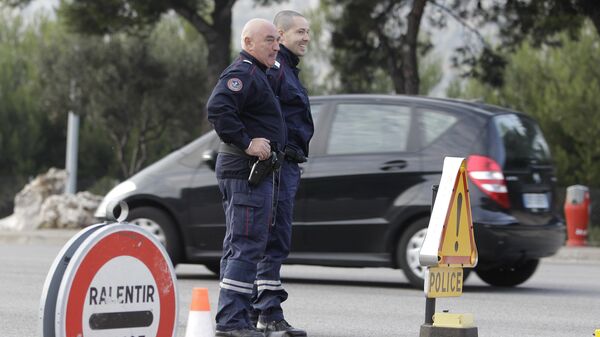The Italian Foreign Minister called the border breach by the French police, who followed a Nigerian immigrant into Italian territory and inspected a local refugee camp on March 30, “a serious incident, overstepping the boundaries for cooperation between two neighboring countries." An investigation was launched; the French were accused of “exceeding their jurisdiction” and “invading private property.”
A Senator from the French Alpine community of Val d'Isère, Guillaume Gontard of the leftist Communist, Republican, Citizen and Ecologist (CRCE) coalition, criticized the existing French border control in an interview with Sputnik.
“It’s a typical example. A senseless, ineffective system exists, and the security services have to act on their own,” he claimed.
According to him, the situation isn't just difficult in the mountains, but also at the Mediterranean seaside. After checking the documents of the Nigerian, Gontard and his fellow politicians and human rights activists went to a local railway station for an unexpected review of the border police (Police aux Frontières).
The Senator claimed that the border station turned out to be a place of detention, where migrants are held for indefinite periods of time in poor conditions before they are deported to Italy. Men, women and underage boys and girls are corralled together in one room. In the Alps, close to the seaside about 46,000 foreigners have been detained over the last year; among them there are 350 'coyotes'.
READ MORE: 'War of All Against All': European Migrant Crisis May Spiral Out of Control
When the migrants arrive at the border, they receive a pre-filled entry denial form. All of the younger arrivals are registered as adults automatically, so even underage newcomers can be marked as grown-ups.
“It’s hard to tell, if this or that refugee has come out of age. But sometimes the documents are filled out already, so they just need to sign it. So it turns out that many of them were born on January 1, 2000,” said Gontard.
The denial doesn’t stop migrants from repeating an attempt to cross the border. Gontard insists the system needs changes and reforms, and said that CRCE was for introducing a new pro-migrant, pro-asylum law, which would alter the country's immigration policy.
“Some come and go to return just the next day. It’s going on and on. We are told we live in a rightful state, but we have witnessed that the basic rights are not followed. What we saw at the border, the conditions, the system, this senseless closure of borders will help us with discussing the new legislations,” concludes Gontard.
The European Union has been struggling to manage a massive refugee crisis which escalated in 2015 with hundreds of thousands of people form the Middle East and North Africa seeking asylum in the EU member states. The EU border agency Frontex detected over 1.83 million illegal border crossings in 2015, in contrast to some 283,000 in 2014.
Preliminary Frontex data for 2016 suggests that 182,500 people crossed the EU border, with the major drop attributed to the EU-Turkey deal on migrants. The figure contrasts sharply with the spike in migrant deaths. According to the International Organization for Migration, over 5,000 migrants died attempting to cross the Mediterranean Sea in 2016, which makes it the most deadly year on record for the Mediterranean migration route.
The views and opinions expressed by Mr. Gontard do not necessarily reflect those of Sputnik.


